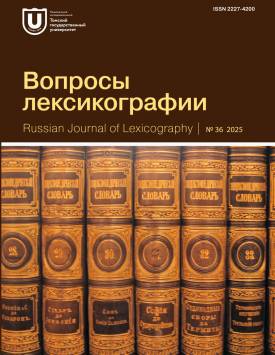Problems of lexicographic description of lexicalized dialectisms with initial ц (ts) and ч (ch)
The article highlights the most pressing problems of lexicographic description of vocabulary with initial ц (ts) and ч (ch) in a compendium type dictionary, caused by the lexicalization of individual phonetic variants of words. Theoretical views on the phenomenon of lexicalization are considered. It is established that ideas about such processes were formed in the first works on phraseology, the term was introduced by representatives of the Prague Linguistic Circle. As a result of the subsequent discussion, lexicalization in territorial dialects should be understood as the results of language processes that have lost their regular character, which lead to the consolidation of a new phonetic shape of the word. The issue of lexicalization is particularly acute in relation to dialectal vocabulary that reflects the history of the ц (ts) and ч (ch) phonemes. In Russian dialectology, various approaches have been developed to interpret the results of transformational processes, allowing us to explain dialectal differences (differentiation of two affricates in dialects, or the coincidence of phonemes in one affricate, or the absence of affricates), either phonetic or phonological. As a consequence, dialectological theory does not provide sufficient justification for definitive conclusions about the finality or non-finality of the lexi-calization process in each specific case. This determined the principles of vocabulary presentation (vocable representation) with initial ц (ts) and ч (ch) in the subsequent issues of the Dictionary of Russian Folk Dialects. A distinction is made between: (1) lexicalized variants that are presented in separate dictionary entries, (2) phonetic variants that undergo lexicalization and are presented with a special sign inside the entry with a historically defined vocable, (3) phonetic variants in the dialects that pronounce “ch” as “ts” or “ts” as “ch” and are not reflected in dictionary entries. When determining the status of words, the authors-compilers and editors take into account numerous factors, including: word-formation and lexical-semantic activity, accentological variability, fixation on a territory that is not characterized by the corresponding phenomenon (pronounce “ch” as “ts” or “ts” as “ch” in its hard or soft variety, lack of affricates in dialects, etc.), fixation of relic variants in the speech of representatives of different generations or in folklore texts, the erasure of etymological connections of words, etc. Thus, the team of authors sought, on the one hand, to follow traditions in compiling the consolidated Dictionary of Russian Folk Dialects, and, on the other hand, to represent the dialectal material as carefully as possible, with minimal distortion of the source data. This is an attempt to reconcile in an explanatory dictionary the principles of historical determinism, areality, and systematicity of phonetic dialectal phenomena. The authors declare no conflicts of interests.
Keywords
Russian dialectology, dialect lexicography, consolidated dictionary, lexicalization, etymology, principle of historicism, principle of systematicityAuthors
| Name | Organization | |
| Bobrova Maria V. | Institute for Linguistic Research of the Russian Academy of Sciences | bomaripgu@yandex.ru |
| Myznikov Sergey A. | Institute for Linguistic Research of the Russian Academy of Sciences | myznikovs@rambler.ru |
| S’yanova Elena I. | Institute for Linguistic Research of the Russian Academy of Sciences | syanovaei@mail.ru |
References

Problems of lexicographic description of lexicalized dialectisms with initial ц (ts) and ч (ch) | Voprosy leksikografii – Russian Journal of Lexicography. 2025. № 36. DOI: 10.17223/22274200/36/1
